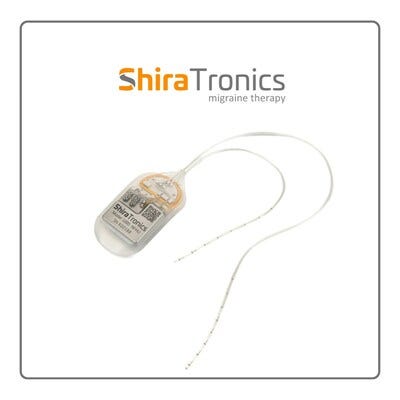ShiraTronics migraine therapy concludes successful pilot study
Migraine is a medical condition that is more common in women
Clinical-stage medical device company ShiraTronics has announced the successful conclusion of enrollment into an Australian pilot study for its minimally invasive, implantable migraine therapy.
Migraine is recognised globally as a significant cause of disability, particularly among pre-menopausal women, and poses a substantial health challenge. It affects 40 million people in the US alone - mostly women. McKinsey has identified migraine as one of the top 10 healthcare burdens, that if unlocked, could help release $1 trillion for the global economy.
For around 2% of the world's population, migraine headaches escalate to chronic attacks, leading to debilitating symptoms such as intense headaches, nausea, and sensitivity to light for a minimum of 15 days each month. Existing treatments often fall short, highlighting the critical need for innovative solutions.
The ShiraTronics device
US-based ShiraTronics has developed a system specifically engineered to address the debilitating symptoms faced by these patients.
The ShiraTronics System delivers precise electrical pulses tailored to disrupt migraine pain signals.
This fully implantable, programmable device aims to offer patients and physicians a novel and potentially more effective treatment option.
About the RELIEV-CM Pilot Study
The RELIEV-CM pilot study, conducted at five centers in collaboration with leading Australian neurology and pain management researchers, is evaluating the performance of the ShiraTronics System.
So far there has been encouraging early data on the potential efficacy of ShiraTronics' innovative migraine therapy.
Early Clinical Indicators
In the pilot study's initial stages, the data unveiled promising results indicating a substantial decrease in both headache and migraine days, as well as notable reductions in headache duration and severity.
Preliminary outcomes demonstrate meaningful headache day reduction after four weeks of therapy and completion of a 28-day headache diary. The outcomes correlate with improvements in participants' Quality of Life Scores and Patient and Clinician Global Impression of Change scores. These early findings not only highlight the potential effectiveness of ShiraTronics' approach but also its potential positive impact on participants' overall well-being.
ShiraTronics Vice President of Global Clinical Affairs, Fred Ecklund said:
"We are grateful to our dedicated investigators and patients whose invaluable contributions have propelled our research forward. As we embark on the next phase of clinical trials with our upcoming pivotal study, we eagerly anticipate continued partnerships that will help us make meaningful strides in advancing therapy options for these patients."
Next steps
The promising results of the pilot study set the stage for the next phase of research, with the RELIEV-CM2 pivotal clinical study scheduled to take place in both the United States and Australia later this year. Co-principal investigators Dr. Brian Grosberg, and Dr. Samer Narouze, will lead the RELIEV-CM2 study, building on the positive outcomes observed in the pilot study.
Brian Grosberg, M.D. is the Director of the Hartford Healthcare Headache Program in Connecticut and Professor of Neurology at the University of Connecticut School of Medicine. He expressed his anticipation for the upcoming study:
"The positive results from the Australian pilot study indicate the potential impact of ShiraTronics' treatment on chronic migraine sufferers. I am excited to co-lead the pivotal clinical study advancing migraine treatment options and further explore the benefits this technology could offer to patients dealing with chronic migraine."
Samer Narouze M.D., PhD an expert consultant in headaches and pain medicine, is currently the chairman of the Center for Pain Medicine at Western Reserve Hospital in Cuyahoga Falls, Ohio. He said:
"I would like to congratulate the ShiraTronics team on their groundbreaking research. This pilot study is truly commendable and is poised to make a substantial contribution to ShiraTronics' future research as they continue to strive to address the unmet needs of chronic migraine patients."



